Tales of Vesperia: Definitive Edition Review
Back when Tales of Vesperia first released over a decade ago, I don't think many people would have predicted that it would eventually garner the sort of mystique that it would one day possess. Not only was it followed up by a series of annualized iterations that would often barely push past mediocrity at their best (at least until Berseria, in my opinion), but its enhanced re-release on PlayStation 3 would never make its way outside of Japan. So Vesperia wasn't just a sort of retroactive high-water mark for the series, but one whose best rendition of itself would seemingly never be within arms reach for much of its wider audience. Perhaps not quite a white whale, but maybe beginning to resemble one when stacked up against, I don't know, Xillia 2. With contributing factors such as being the last game in the series to heavily rely on cel-shading, containing one of Sakuraba's last great soundtracks, and remaining intriguingly gated to the Xbox 360 outside of Japan until now, Vesperia somehow became something a little more than just another franchise JRPG over the last ten years.
This context ends up making the release Tales of Vesperia: Definitive Edition actually quite fascinating.
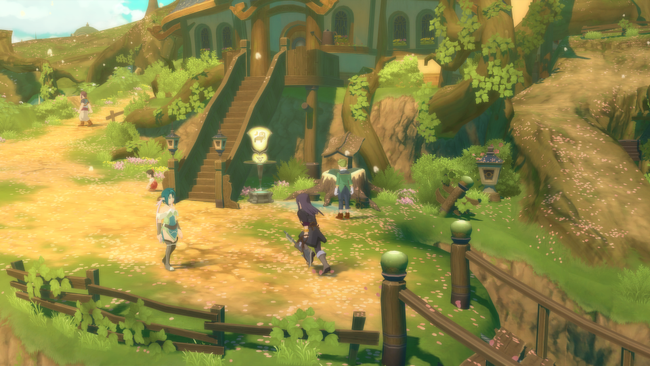
Not only is Vesperia's Definitive Edition finally bringing over the changes from the enhanced PS3 release of the game to western shores, but it's releasing with the widest net possible - on all three major consoles as well as continuing the series's stable presence on PC. In a way, it's pretty much the exact opposite of Vesperia's initial outing. Not only was I excited to finally try out many of the changes that I could previously only read about in wiki pages and comparison tables, but I was also eager to revisit a game so that I, ten years older and (hopefully) wiser, had continued to look back on quite fondly.
The Tales series has never really been known for aggressively pushing boundaries or taking sweeping explicit risks, instead relying on minor iterative adjustments on its familiar design. Tales of Vesperia especially relies on a formula that was well-worn even back when it originally released in 2008. Ranging from its three-part narrative structure culminating to a world-saving epic, its party-based battle system with discrete encounters, and its archetypal cast of characters, there's nothing here that's really going to take anyone off-guard. However, Vesperia's strength always was, and remains, the quality of its execution on these familiar aspects.
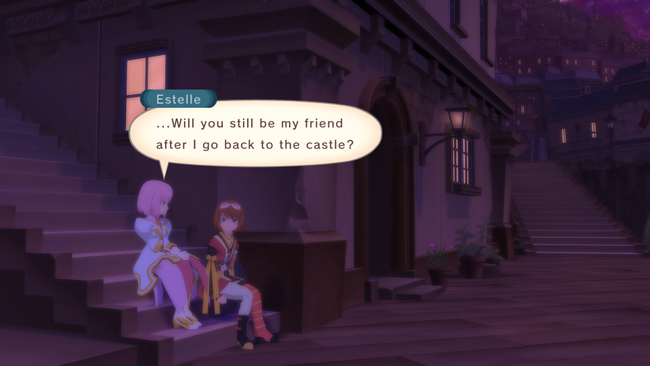
Vesperia's cast, especially, is enduringly fantastic. While several archetypal components of the party makeup and such are still in place, It doesn't really come as an overall detriment to Vesperia's narrative. While a game like Berseria chose to loudly subvert expectations with its cast and the events of its first dozen hours or so, Vesperia instead chooses to quietly be not-quite what one might originally expect. The overall story outline of Vesperia is solid - not spectacular, and drags on a bit as Tales games do. However, Vesperia's cast greatly bolsters it above being merely okay into something quite special.
Yuri Lowell, Vesperia's protagonist, is easily the highlight here, and the strength of the game's cast leans heavily on the framing of his character. As a former knight turned equal parts folk-hero and vigilante, Yuri is already pretty well established before the player is involved. The complexities to his character become apparent as he interacts with the game's other party members -- specifically, he behaves somewhat differently depending on whomever he's talking to. When speaking to the young hunter Karol, he's generally more enthusiastic and optimistic, and really tries to build him up by acting as something resembling an older sibling. With the short-fused Rita, he's more standoffish and curt - matching her general demeanor. With Estelle, he's initially a bit annoyed at her naivety -- effectively calling her unwanted baggage to her face -- but eventually grows to become incredibly close to her.
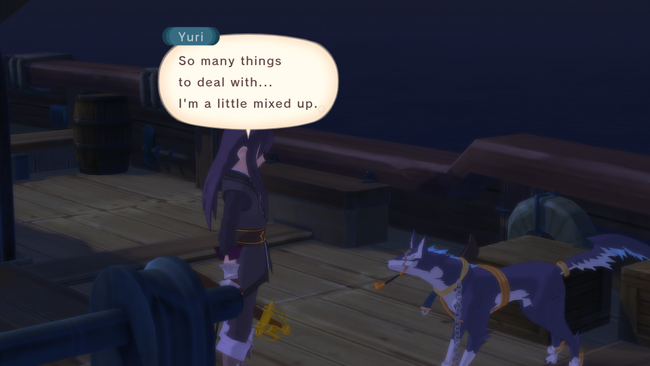
Vesperia even uses these interactions in interesting ways. For instance, once some of Yuri's early game crimes are revealed to the party, Karol - who had begun to look up to Yuri with an incredible amount of respect - feels betrayed and asks Yuri why he wasn't told. Yuri, in return, can barely eke out an excuse, nor much of an apology, clearly feeling guilty knowing he disappointed someone who trusted him. It's an interesting tear-down moment for the game, and not one that ever has a clean resolution - it's a relatively different dynamic for a game from a series that otherwise behaves in a more formulaic manner.
The rest of the cast is similarly well-rounded and multifaceted. Rita and Estelle's growth from reluctant travel companions to best friends (and potentially more) is even more pronounced with new and extended scenes from the PS3 additions to the game. Flynn and Yuri's competing views about morality and justice is a similarly complex dynamic that showcases a multi-chaptered friendship in an incredibly believable manner. Even Patty, an additional character added to later editions of the game, is given plenty of screentime to earnestly interact with the entire cast as well. For a series that often boils archetypal characters down to one or two defining character traits to pair with unearned melodrama, Vesperia is a standout in this regard. The scene-to-scene progression is far more standard fare, but even the overall plot hinges on some interesting character dynamics between the cast and their antagonists.
One huge drawback to this character discussion is a footnote related to the English voiceover work. While the Definitive Edition offers the option to choose from Japanese voiceovers or English ones every time you boot up the game, I personally had developed a strong affinity for the English cast, which was anchored by some stellar performances back with the 360 version of the game. However, the newer lines, extended scenes, and even additional skits and abilities were never cast in English, so several of those lines had to be newly recorded for this latest version. Several cast members were not available, for one reason or another, to reprise their roles. While Cup of Tea doesn't explicitly list voice actors in the credits, it's immediately obvious that Yuri, Judith, and potentially a few other characters, all have new voices for their characters' new (or newly voiced) lines.
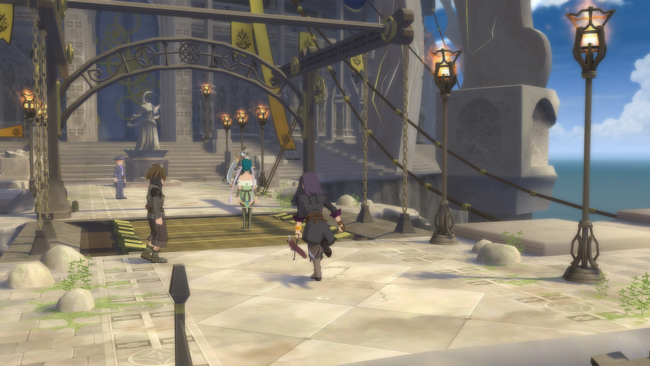
While I initially expected the mismatched voices to be distracting and jarring going into the game, I wasn't prepared for the extent that this ended up being true. Not only are new scenes with Patty and Flynn cast with the new voices, but previously unvoiced scenes in old locations are as well. What this results in is that the game can flip from one set of actors to the other and back again constantly without any real sense of regularity. Older scenes are sometimes extended so that the cast will swap over mid-conversation.
Not only that, but since new abilities are newly recorded, the voicing can switch over and back again in the middle of a combo. If the new actors had perhaps been better sound-alikes, maybe this wouldn't have been an issue, but unfortunately, that's not the case. A seemingly better solution would have been to rerecord the old lines with the new actors in the same manner Persona 4 Golden did when it couldn't get the actors for Teddie and Chie to return. Instead, we get this jarring mess that should have been a footnote instead of a consistent irritation. Despite loving the work of the English cast, it's hard to recommend at all in this state.
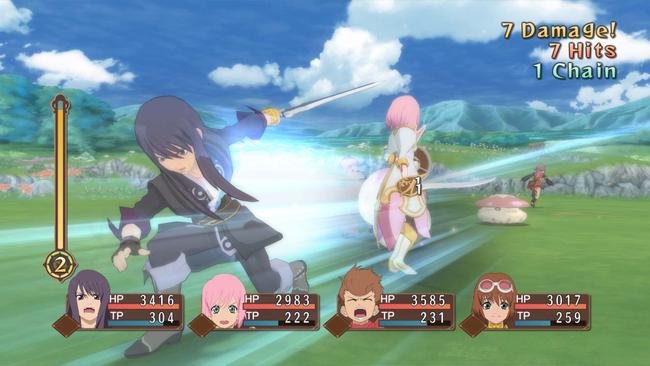
Vesperia's combat system is pared back a bit compared to newer entries in the series and action RPGs in general, but I didn't ever feel too frustrated with the more limited systems at play here. While the game does take a bit to open up and TP (effectively, Mana Points) seems incredibly sparse in the game's first act, the pace ramps quickly past that. Artes, the character abilities used in battle, passive skills learned from weapons, and obtaining new gear largely through crafting form an interlocking set of mechanics that continuously gives the player something to work towards along with a sense of progression even when undertaking side content or just exploring a new area.
Several of the passive skills fundamentally change how a character plays in battle ranging from which artes can be chained together to which abilities can be movement canceled. Contributing to this from the PS3 enhancements is the ability to link up to 16 artes on a single character -- up from 8, and half of these can be shortcuts to other characters as well. Each character plays fundamentally differently as well, and even Patty and Flynn don't even feel like superfluous additions to the cast in terms of playstyle. These small additions help to stretch the combat encounters with a surprising degree of variety and allow it to still hold up. Even the light puzzle solving within dungeons feel like a breath of fresh air compared to the drab corridors of later Tales entries.
While Vesperia's combat system manages to remain engaging in 2019, the same can't really be said about the game's side quest design. The sheer amount of optional content ranging from little extra world-building scenes to bonus dungeons and bosses is actually quite remarkable. With rewards like unique weapons to costume titles and accessories to some hilarious side stories, there are lots of reasons to seek out these little bonus events whenever possible. However, many of these scenes feel incredibly arbitrary in nature when it comes to progressing them.

Scenes will kick off when you're least expecting them, featuring characters you haven't interacted with in several hours, and unlike the primary questline, there's no real synopsis to track objectives as you run into them -- often accidentally. Arbitrary cutoffs and confusing requirements can be incredibly frustrating, knowing that you might miss an event because you didn't reenter a specific old location before the next plot point. Luckily, there are numerous guides that can alleviate the issue somewhat, but requiring such a checklist to be pinned on a second screen to constantly refer back too feels like something that should have stayed back in 2008.
Lastly, since I did play this on PC, which would have been unthinkable in 2009, Vesperia's definitive edition also manages to perform reasonably well in this regard. While the number of in-game options are pretty limited, I was able to play at 4k/120hz (2080Ti/6700k) without many issues at all, and Vesperia's artstyle does pair well with higher rendering resolutions. Both NVidia's and Steam's overlay suites performed without issue in terms of screen capture and recording capability, and the included Borderless mode worked exactly as I wanted it to out of the box. Menus even have surprisingly effective mouse control for the diehards. The one minor issue that I had were that the game would often see both inputs from my controller and my mouse inside of menus, and I feel like an autosave feature really should have been implemented.
I was almost relieved to see that my general opinion on the strongest aspects of this game remained intact, perhaps even improved within the context of some of the series' releases in the last decade. While adjusting to some of the more traditionally structured combat mechanics was a little bit of a shift, this came out in the wash with some of the improvements added from the PS3 release. The state of the English localization is a bit of bigger disappointment than I expected it to be, but playing through Tales of Vesperia again has been a pleasure. With one of the most endearing casts in the genre and an enduringly strong take on action combat gameplay, Tales of Vesperia remains as the series peak and I easily recommend it for fans to revisit and newcomers to experience for the first time.